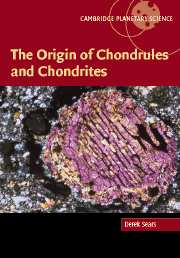Book contents
- Frontmatter
- Contents
- List of figures
- List of tables
- Preface
- 1 Historical introduction
- 2 Potential meteorite parent bodies
- 3 Chondrites and their main properties
- 4 Chondrules and their main properties
- 5 Theories for the origin of chondrules
- 6 Discussion of theories for the origin of chondrules
- 7 Discussion of theories for metal–silicate fractionation
- 8 So how far have we come and where do we go next?
- References
- Index
1 - Historical introduction
Published online by Cambridge University Press: 12 August 2009
- Frontmatter
- Contents
- List of figures
- List of tables
- Preface
- 1 Historical introduction
- 2 Potential meteorite parent bodies
- 3 Chondrites and their main properties
- 4 Chondrules and their main properties
- 5 Theories for the origin of chondrules
- 6 Discussion of theories for the origin of chondrules
- 7 Discussion of theories for metal–silicate fractionation
- 8 So how far have we come and where do we go next?
- References
- Index
Summary
Rocks from the sky
The ancients observed and collected rocks that fell from the sky. There are reports of the Romans, Greeks, Egyptians, Japanese, and the natives of North America and other countries collecting them, using them for trade, and putting them in places of importance such as tombs. Modern-age research on such objects opened with the pioneering work of Howard and Bournon (Fig. 1.1). Aristocrats Edward Charles Howard and Jacques Louis Compte de Bournon published arguably the first scientific investigation of these rocks or meteorites as they are now known (Howard, 1802). They found that these rocks, regardless of where in the world they fell, contained metal, sulfide, stony materials, and very often “curious globules” in varying amounts. What was also remarkable was that the metal in all these rocks from the sky – whether it was tiny metallic grains in the more stony meteorites or the large masses of “native iron,” now known to be iron meteorites – was found to contain nickel, a novel and only recently discovered element. Clearly, from the first day that these rocks were seriously examined their major components, which would have to be explained, were identified. As the nineteenth century unfolded, Greek names were attached to these objects, and the globules became “chondrules” and the type of rocks that contain them became “chondrites.”
Metal, sulfide, and stony materials had been seen before, but these curious globules and nickel-bearing metal were unique.
Information
- Type
- Chapter
- Information
- The Origin of Chondrules and Chondrites , pp. 1 - 20Publisher: Cambridge University PressPrint publication year: 2004
